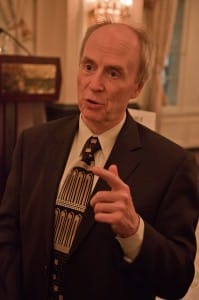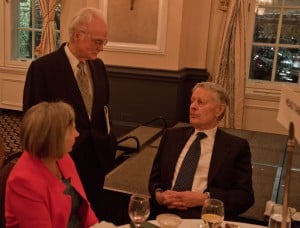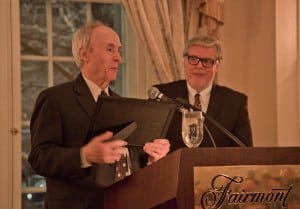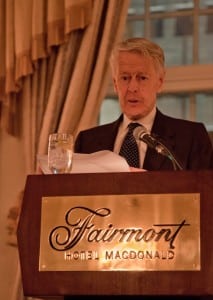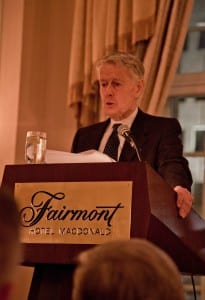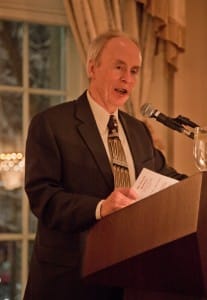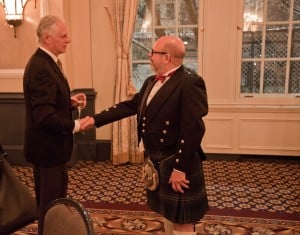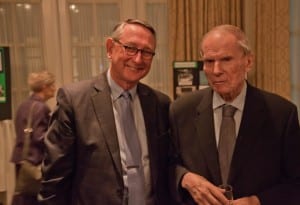All photos courtesy of Jack Bawden
A Tale of Political Intrigue in Alberta Courts
LASA hosted its annual historical fundraising dinner in Edmonton on February 25, 2016 at the Fairmont Hotel Macdonald. This was LASA’s first Historical Dinner in Edmonton since 2011, when the Honourable Jack Major spoke about fascinating cases and other shenanigans in Alberta’s legal history.
We were delighted to have the Honourable Jean Côté, recently retired from the Court of Appeal of Alberta, speak about the intriguing interplay between the Alberta courts and politics, with a particular focus on what is commonly known as Bankers’ Toadies.
During a difficult period in Alberta’s history, frustration brought fear and rancor to a boil during the Great Depression. In 1935, Albertans elected a Social Credit government ousting the United Farmers of Alberta, who had held power since 1921. Led by Alberta’s didactic Premier, William Aberhart, spurred by personal weakness and ignorance, he made alliances with dangerous, zealous advisors imported from desperate and dying causes overseas.
Justice Côté spoke about the rise of the Social Credit Party in 1935 and the events that led to the release of the Bankers’ Toadies flyer. Coming to power in the middle of the Great Depression, Aberhart had promised to establish Social Credit theory. He introduced plenty of legislation, which became untenable, aimed at banking, the press, private property and civil rights. This led to numerous fights with parliament and the courts.
By 1937, Aberhart became less popular with numerous individuals and groups, including the leader from the English Social Credit movement, Major C.H. Douglas, the press, Social Credit supporters, the Social Credit Board, his own Cabinet, the courts, the police, voters, and the Social Credit caucus. This led to a call for Aberhart to resign. Following the failure of a promised leadership review, his caucus revolted in its entirety. Aberhart introduced something similar to recall legislation, which allowed voters to remove their MLA. After Aberhart’s constituents voted an overwhelming two-thirds to remove him, Aberhart simply repealed the legislation retroactively.
Justice Côté explained that Aberhart became paranoid and believed that conspiracies were abound to oust him. Though Major Douglas was reluctant to assist Aberhart, he sent in his stead two experts, George Powell and L.D. Byrne. Teaming with these two, Aberhart became more despotic as he believed his movement was at war with his opponents.
This led to an explosive open battle with the legal community to which no judge or lawyer was immune. Conspiracies ruled the day. The Premier concluded that the banking system was to blame for the Great Depression. In response, a group of lawyers and businessmen organized to counter the government’s anti-business sentiment. This group, known as the People’s League, became the target of an ominous campaign to vilify and discredit all those who opposed Social Credit.
It culminated in 1937 with the appearance of a leaflet that named a number of prominent lawyers and businessmen in Edmonton. The flyer, labeled ‘Bankers’ Toadies’, was anonymous, but was certainly framed with propagandistic overtones, “[m]y child, you should NEVER say hard or unkind things about Bankers’ Toadies. God made Bankers’ Toadies, just as He made snakes, slugs, snails and other creepy-crawly, treacherous and poisonous things. NEVER therefore, abuse them – just exterminate them!”
It is unclear if this leaflet was ever directly attributed to the Premier. However, presumably, given the religious references and 16,000 flyers obtained from the Social Credit League’s office following a police raid, Aberhart knew of the text’s lanuage. Following the police raid, two men – political expert Powell and Social Credit MLA and Whip, Joseph Unwin – were arrested. They were charged with sedition and inciting murder, as well as criminal libel. The two former charges were dropped, but the investigation into the latter charge was underway.
Edmonton Police Magistrate, Andrew Gibson, K.C., found enough evidence to commit the two men to trial in front of the Honourable W.C. Ives, a judge on the Supreme Court of Alberta, Trial Division. Aberhart, who was also Attorney General, refused to allow any public prosecutor to take part in the proceedings. After Ives found that the Premier abused his authority, the trial proceeded. The complainant, General W.A. Griesbach retained George Steer, K.C. who was aided by Wilbur Bowker. Both accused were convicted of criminal libel with Powell being sentenced to 6 months and Unwin 3 months of hard labour in a provincial jail. Furthermore, Ives ordered Powell be deported after serving his sentence.
Following an unsuccessful appeal in front of five appellate judges, Chief Justice Horace Harvey affirmed the conviction. Aberhart did not stop there. He pressured the Prime Minister, William Lyon Mackenzie King, to pardon Powell and Unwin. King refused to interfere, and the two men finally went to jail. It is unlikely either man did any real hard labour. In fact, Powell spent most of his days drafting Social Credit legislation. Moreover, both men were released early. Though Ives ordered Powell deported, it is unlikely this was carried out. Powell eventually returned to England on his own volition.
Justice Côté concluded his speech summarizing the fallout from the Bankers’ Toadies incident. Despite the controversy, Albertans gave the Social Credit Party a second mandate, though with a smaller majority, in the 1940 election. Unwin became the first victim having failed to get reelected.
Others fell victim to Aberhart’s vengeful behaviour. John Hugill, K.C., the most experienced member of the Social Credit Party and the government’s first Attorney General, was dismissed early in the government’s first mandate and was forced to pay work-related expenses retroactively. Moreover, Aberhart used his position as Premier to prevent Ryerson Press from publishing Hugill’s memoirs. The Premier threatened to cancel Ryerson’s contract supplying Alberta schools with textbooks if they published the memoirs.
Alberta’s Lieutenant Governor, John Bowen, took issue with what he believed were several unconstitutional bills. Aberhart publicly punished and humiliated Bowen by cutting off all of his resources – his residence, security, driver and secretary – to properly do his job. Furthermore, any official travel and hosting duties on behalf of the Alberta government were to be paid by Bowen personally.
Aberhart then turned his attention to several institutions that he believed were in a conspiracy against him. His first target was the press when the Social Credit Board, in an unprecedented move, took control over the content of newspapers. This allowed, as Justice Côté explained, the Cabinet of the day to shut down newspapers. Individual reporters were not immune either. An Edmonton-area journalist was convicted of contempt by the Legislature for having published a minor error on a statement given by a Social Credit MLA. The punishment of jail time was later repealed, and the official legislative transcript altered to exclude any mention of the initial sentence.
The Premier, who believed bankers and wealthy Albertans were to blame for the Great Depression, punished these groups with prohibitive tax increases amounting to a combined federal-provincial income tax equaling over one hundred percent for high-income earners.
The legal and judicial communities became targets. Aberhart attempted to infringe on the legal profession’s independence to self regulate and discipline lawyers. As a result, the Law Society of Alberta set up the Assurance Fund to protect the profession’s independence. The Honourable Horace Harvey, Chief Justice of Alberta, was punished when Aberhart used his influence to oust Harvey from the University of Alberta’s Board of Governors. The Premier could not go after his position on the Bench, so he condemned the respected jurist by removing him from sitting on the Board of Governors, a role Harvey thoroughly enjoyed.
Aberhart’s last victim was Magistrate Gibson, whose only offence was doing his job when he issued the search warrant and committed two of Aberhart minions to trial. As Justice Côté suggested, this was a clear-cut case as both the Trial and Appellate Divisions found the issue to be proven beyond a reasonable doubt. In what can only be deemed a conflict of interest, Aberhart, as Attorney General, recommended removing Gibson as Magistrate, which was then approved by Aberhart as Premier. Gibson was given no reason for his removal, but later told the press it was likely because of his actions regarding Unwin and Powell. He practiced law in Edmonton and Fort Saskatchewan before receiving a federal appointment as Stipendiary Magistrate in Fort Smith, Northwest Territories.
Justice Côté’s speech showed that this period in Alberta history was neither dull civil nor dull.
On behalf of the staff and Board of Directors for the Legal Archives Society of Alberta, I would like to thank all those who attended this wonderful event in Edmonton, and continue to support LASA. Also, I would like to thank all the speakers who added their own unique contributions to the evening. And, last but certainly not least, a big thank you to the Honourable Jean Côté whose knowledge and passion for Edmonton’s legal history, and storytelling made the Edmonton dinner a great success.






